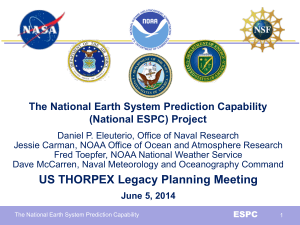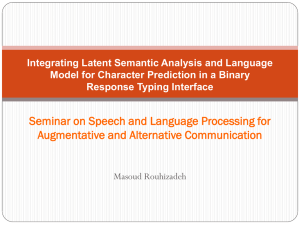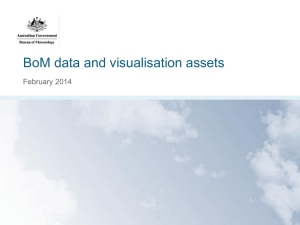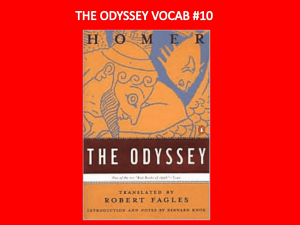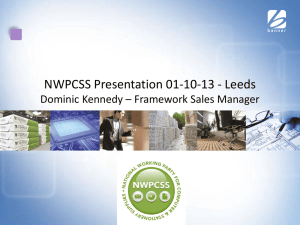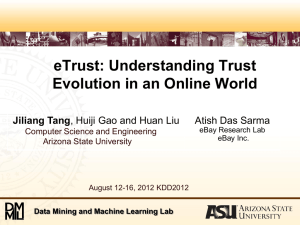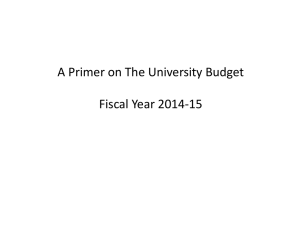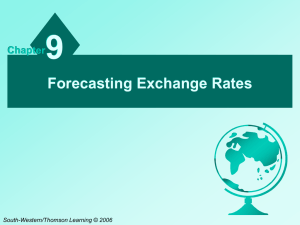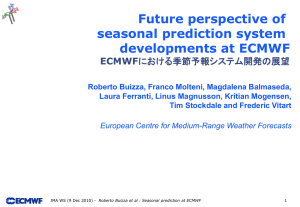A Wood, HEPEX-GEWEX seasonal forecast experiment, GEWEX
advertisement
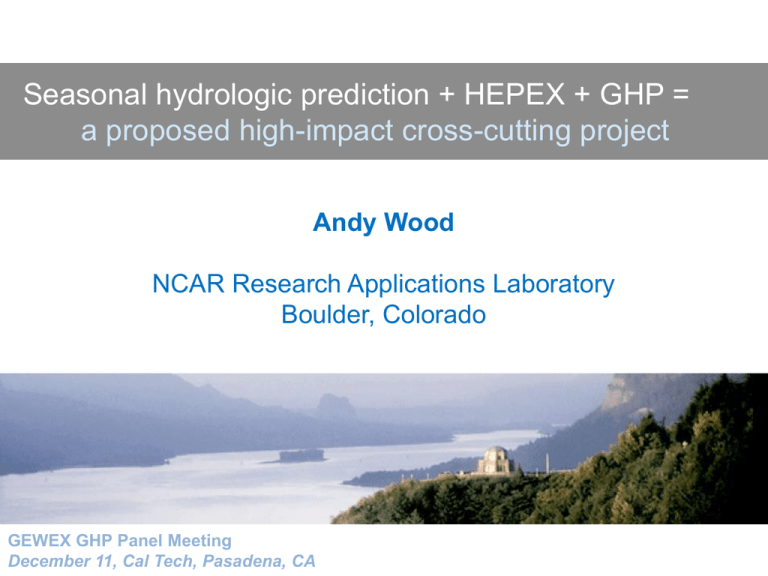
Seasonal hydrologic prediction + HEPEX + GHP = a proposed high-impact cross-cutting project Andy Wood NCAR Research Applications Laboratory Boulder, Colorado GEWEX GHP Panel Meeting December 11, Cal Tech, Pasadena, CA Outline • HEPEX Background • The Value of Seasonal Hydrologic Prediction – An example from practice • Hydrologic Prediction Science & Research • A HEPEX-GHP Intercomparison Experiment? HEPEX Overview HEPEX mission: To demonstrate the added value of hydrological ensemble predictions (HEPS) for emergency management and water resources sectors to make decisions benefitting the economy, public health and safety. Key questions of HEPEX: • What adaptations are required for meteorological ensemble systems to be coupled with hydrological ensemble systems? • How should the existing hydrological ensemble prediction systems evolve to account for all sources of uncertainty within a forecast? • What is the best way for the user community to take advantage of ensemble forecasts and to make better decisions based on them? HEPEX is now best known via an active website HEPEX Activities • Community Meetings & Workshops • Many smaller sessions: AGU, EGU, GEWEX, EMS, AMS, etc. • Articles and Journal Special Issues – – – – – • • • • • HESS: HEPEX Special Issue EOS Article BAMS Article ASL Special Issues (2) Hydrological Sciences Test-bed Projects (several) Experiments (several) Online Community Highlight Case Studies Webinars (regular) www.hepex.org HEPEX: Merging Science with Pragmatism The Basics: Making a Prediction System Work Models, Data, Systems Workflow/Data Management Platform Hydro/Other Observations Historical Forcings? Spinup Forcings Hydro/Other Models Forecast Forcings Streamflow & Other Outputs Products, Website real-time operations HEPEX: Making a Prediction System Work Well Methods & Tradeoffs Workflow/Data Management Platform Historical Forcings (regional) parameter estimation Hydro/Other Observations objective DA feedback into component improvements verification Spinup Forcings Forecast and Hindcast Forcings end-user communication calibrated downscaling Appropriate Hydro/Other Models postprocessing, forecast calibration Streamflow & Other Outputs Products, Website hindcasting, ensembles (uncertainty), benchmarking, real-time operations Outline • HEPEX Background • The Value of Seasonal Hydrologic Prediction – An example from practice • Hydrologic Prediction Science & Research • A HEPEX-GHP Intercomparison Experiment? The Arid Lands Many droughts will occur; many seasons in a long series will be fruitless; and it may be doubted whether, on the whole, agriculture will prove remunerative. John Wesley Powell, 1879 Report on the lands of the arid region of the United States ‘water supply forecasts’ 1-12, even 24 months large reservoirs NCAR statistical/ESP Boulder, Colorado ‘runoff outlooks’ 1-3 months smaller reservoirs ESP Precipitation, 1971-2000 8 Colorado River 25 million people in 7 states rely on Colorado River water 3.5 million acres of irrigation 85% of runoff comes from above 9000 feet Mean annual discharge is … (?) Storage capacity is about 60 MAF (45 times mean annual flow) Management using Seasonal Flow Forecasts Upper Colorado Reservoir Management Water transfer from upper to lower basin states depends on forecast Major releasesdecision depend on CBRFC April 1 Forecasts 3,635 1/1/10 Projection 15.4 1/1/010Proj ection 1,098 1/1/10 Projection 11.4 1/1/10 Projection 10 Simple Statistical Forecasting Trial Lake SNOTEL Sample Equation for April 1 forecast of April-July Flow: April-July volume Weber @ Oakley = + 3.50 * Apr 1st Smith & Morehouse (SMMU1) Snow Water Equivalent + 1.66 * Apr 1st Trial Lake (TRLU1) Snow Water Equivalent + 2.40 * Apr 1st Chalk Creek #1 (CHCU1) Snow Water Equivalent - 28.27 Source: NRCS Data Assimilation Preparation Modeling Dissemination Temperature index model for simulating snowpack accumulation and melt Simulation and Analysis Observed Hydrology Sacramento Soil Moisture Accounting Model Stakeholder Example • Metropolitan Water District (California) • Supplies water to ~20m residents in southern California (including L.A.) • Issues weekly water supply conditions map (right) based on RFC, CA DWR, and NRCS forecasts and data 13 Seasonal streamflow prediction is critical One example: Met. Water Dist. of S. California (MWD) MWD gets: Surplus 1.25 MAF OR 0.55 MAF +$150M gap ? from B. Hazencamp, MWD 14 Value • • • • Damage from 1/10 AZ storm: Damage from 6/10 UT flooding: Damage from 12/10 UT/NV storm: Damage from 09/13 Boulder flood: • Colorado River average runoff: • Replacement value at $330/AF -> – Indirect multiplier ~3? $11ma $6.5ma $11ma $1bc 12.4 MAF $4bb $12b The economic value of water resources typically greater than flooding damages • • • Sources: a: WFO, FEMA (via stormdata); b: MWD (via Hasencamp, private communication) c: Wikipedia i15 End Outline • HEPEX Background • The Value of Seasonal Hydrologic Prediction – An example from practice • Hydrologic Prediction Science & Research • A HEPEX-GHP Intercomparison Experiment? hydrologic prediction science questions hydrological predictability meteorological predictability Hydrological Prediction: How well can we estimate catchment dynamics? – Accuracy in precipitation and temperature estimates – Fidelity of hydrology models – process/structure – Effectiveness of hydrologic data assimilation methods Atmospheric predictability: How well can we forecast the weather and climate? Water Cycle (from NASA) Opportunities: How do these areas influence variability informing different water applications? Hydro-climatic/Seasonal Variation in Watershed Moisture • • • • humid basin uniform rainfall no snow small cycle driven by ET • • • • • cold basin drier summers deep snow large seasonal cycle April snowmelt dominates May-June runoff Assessing the sources of flow forecast skill vary predictor uncertainty measure streamflow forecast uncertainty Wood et al, JHM 2014 (submitted) Snow-Driven Basin in the Western US • Wide seasonal variations in influence of different skill sources • cold forecast period (DecFeb) -- forecast skill depends mainly on initial condition accuracy • warmer snowmelt forecast period forecast skill depends strongly on met. forecast skill IHC: initial Hydrologic Conditions SCF: Seasonal Climate Forecasts Flow Forecast Skill Elasticities • The % change in flow forecast skill versus per % change in predictor source skill • Can help estimate the benefits of effort to improve forecasts in each area • This research is funded by water management agencies – Reclamation and US Army Corps of Engineers North American Multi-Model Ensemble at NOAA The NMME is the latest/greatest effort at climate prediction from N.A.: - models vary in skill each month, and by region GEWEX Seasonal Forecast Research Examples There is a large-scale GEWEXsupported line of seasonal hydrologic prediction work. • Less connected with users, looking at underlying science issues. • A popular target application is drought monitoring/prediction. Eric Wood has just completed an assessment of using National Multi-model Ensemble climate prediction in hydrologic LSMs for RHP basin seasonal prediction. (accepted in BAMS, Xin et al, 2015) From: Eric Wood Hit Rate for Drought Prediction GEWEX Seasonal Forecast Research Examples Eric Wood’s NMME climate prediction in hydrologic LSMs for RHP basin seasonal prediction. (accepted in BAMS, Xin et al, 2015) • Rainfall skill Individual model prediction skill varies • For seasonal time scales, precipitation skill varies from poor to moderate • depends on season and lead time • depends on location • may depend on largescale ‘climate state/regime’ East R at Almont, Co, precip (very difficult location) 43 The urgency of understanding predictability Dec 8, 2014 The urgency of understanding predictability NMME forecast for precip (terciles) Dec 8, 2014 AU Seasonal streamflow forecasting: dynamical-statistical QJ Wang, CSIRO http://www.bom.gov.au/water/ssf/ Efficiency – Complexity Tradeoff • A number of forecasting centers around the world have offered seasonal streamflow predictions for decades (over 8 in the US, for instance). - Other countries/agencies are interested in starting such services. • The approaches span a wide range of data requirements & complexity. From simplest to most complex (light to heavy data lift): a. regression of flow on in situ obs (rainfall, SWE, flow) - ‘regression’ = regressive technique, ie PCR, MLR, etc. b. the same but with teleconnection indices included as predictors c. the same but with custom climate state predictors (eg EOFs of SST) or climate forecasts d. land model based ensemble simulation (eg ESP or HEPS) without climate forecast - possibly with short to medium range prediction embedded e. climate index (or custom index) weighted ESP f. climate forecast weighted ESP (eg using CFSv2 or NMME in the US) g. climate forecast downscaled outputs with weather generation for land model ESP/HEPS - from one land/climate model or multi-model; from simple land model to hyperresolution h. d-g with statistical post-processing to correct model bias i. d-g with post-processing to correct bias and merge with other predictions (cf BOM approach) j. d-g with DA to correct land model errors (particularly with snow variables) k. d-g with both post-processing AND DA 30 simple statistical approaches can be viewed as benchmark for dynamical approaches Outline • HEPEX Background • The Value of Seasonal Hydrologic Prediction – An example from practice • Hydrologic Prediction Science & Research • A HEPEX-GHP Intercomparison Experiment? Relationship between GHP and HEPEX A common motivation: the existence and impacts of floods and droughts HEPEX RHPs Improving scientific understanding of regionally significant features water & energy cycle, leading to: - Better models - Better datasets Applying improved scientific understanding, data and models to improve operational prediction of floods and droughts Applications motivate & inform the research • tighten focus • change level of scrutiny Prediction Applications HEPEX methods filtering into operations for - Water/energy management - Hazard mitigation R2O/O2R – an arduous trek requiring tradeoffs I wonder if I can carry my hyper-resolution ESM predictions across this gap? Those researcher forecasts are too biased to use in my river basin… Research Applications How could a cross-cut project help strengthen the relevance of research to applications? Seasonal Forecasting Cross-cut Project Concepts Possible thrusts 1. GEWEX-ish: Science-oriented exploration of seasonal climate and hydrologic predictability from state-of-the-art datasets and models in RCP/RHP study domains. - Eric Wood would lead 2. HEPEX-ish: How well do methods across the statistical-dynamical spectrum harness local-to-regional scale hydrometeorological predictability – for a basin collection determined from water resources considerations. - Andy Wood / HEPEX would lead http://www.ral.ucar.edu/ staff/wood/case_studies/ Experimental Outline 1. Set leads/participants (solicit through HEPEX & GHPs) 2. Coordinate: - define study basins protocol for evaluation scope/timeline of experiments 3. Assemble data, models, methods 4. Predictability Experiments - What sources of predictability dominate seasonally, for various leads & predictands, locations, variables? Where are the greatest uncertainties / weaknesses and scientific limits? 5. Approach Intercomparisons - What is the marginal benefit of dynamical approaches over statistical ones for various types of prediction? Where are dynamics necessary? 6. Dissemination / Outreach - Website key, publication, also local interaction with users Relevant Recent & Future Events Recent • BfG (Koblenz) hosted a recent meeting on seasonal forecasting for water management • will lead to a Guidelines document for WMO on Seasonal Prediction (led by Jan Danhelka, CHMI). • http://www.bafg.de/DE/05_Wissen/02_Veranst/2014_10_15.html Future • HEPEX Seasonal Forecast Meeting hosted by SMHI, Sweden, September 2015 • Summer short course on Seasonal Forecasting? • Seas. Climate/Hydrology Ensemble Prediction Experiment (SCHEPEX … )? Questions? 37 Applications and Elements QJ Wang, CSIRO Multiple statistical models [Schepen, Wang & Robertson – JCLI 2012], [Wang, Schepen & Robertson – JCLI 2012] Combining statistical and dynamical models [Schepen, Wang & Robertson – JGR in press] GCM calibration, bridging and merging [Schepen, Wang & Robertson – JCLI in review] Combining multiple GCMs [Schepen & Wang – MWR in review] Forecasting monthly rainfalls to long lead times [Hawthorne, Wang, Schepen & Robertson – WRR in review] Forecasting seasonal rainfall across China [Peng, Wang, Bennett, Pokhrel & Wang – JOH in review] Forecasting seasonal temperature Forecasting Hydrology / Streamflow
